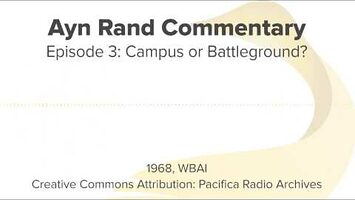Objectivism
Encyclopedia
Objectivism is the term that Ayn Rand coined to describe her system of ideas. The central themes of Objectivism are that individuals should regard their own happiness as an end in itself; that reason is their only source of knowledge and moral guidance; that people should deal with each other on the basis of mutually beneficial trade, rather than sacrifice; and that the ideal political and legal system is laissez-faire capitalism, in which a strictly limited government protects individuals’ rights to life, liberty, and property. Thus, Objectivism includes aspects of libertarianism as a political doctrine, but it grounds that doctrine in the broader context of an entire philosophical system.
Rand articulated those ideas in her best-selling novels The Fountainhead and Atlas Shrugged and in nonfiction works such as The Virtue of Selfishness and Capitalism: The Unknown Ideal. She was among the most influential authors in launching the modern libertarian movement. Some previous writers had defended the morality of free exchange and the many benefits it creates, but Rand’s distinctive contribution to the defense of capitalism was to portray it as a moral ideal. Her ethical theory revolves around the love of achievement, and she saw capitalism as the only economic and social system that consistently fostered and rewarded productive work and achievement. With the failure of some socialist communities, some intellectuals had argued that man was not good enough for socialism. Rand argued that socialism was not good enough for man.
Every philosophical system rests on a basic worldview regarding the nature of reality and man’s place in it. Objectivism holds that there is no higher realm beyond the natural world perceivable by the senses, that nature is governed by a causal order discoverable by science, and that man is an animal who, like other animals, is part of that order. It denies the existence of God and of any life hereafter. It holds that reason is man’s only means of knowledge—not only in science, but in morality and other humanistic areas—and thus denies the validity of faith, revelation, and other nonrational sources of knowledge.
Unlike many secular thinkers, however, Rand did not reduce human nature to conditioned reflexes, evolutionary drives, or economic interests. Objectivism holds that man’s faculty of reason, while dependent on the evidence of the senses for its data, allows us to go beyond what is directly given, integrating sensory data into abstract concepts and principles, using logic to derive inferences from observations, and developing comprehensive theories to explain what we observe. Reason allows us to live by production, rather than by scavenging or plunder. As a volitional faculty, reason also gives rise to the need for morality and for other nonmaterial goods, such as art and love.
A philosophical system also must address issues of good and evil, values and virtues, and justice and rights—in short, the nature and standards of morality. Rand was an advocate of ethical egoism, the moral principle that a person should pursue his own self-interest. She was a vehement opponent of altruism, the ethical principle that prescribes self-sacrifice and service to others as the highest or primary good. Challenging both the religious tradition of subservience to God and the collectivist call for subordinating the individual to the collective, she argued that altruism is irrational and that it stifles everything good in human nature. The purpose of morality, Rand held, “is to teach you, not to suffer and die, but to enjoy yourself and live.”
Objectivist ethics is a form of enlightened egoism. It does not define self-interest in terms of subjective desire, nor of exclusively material goods such as wealth. Rather, as Rand put it, self-interest is defined by “the terms, methods, conditions and goals required for the survival of a rational being through the whole of his lifespan.” As a living being, man must survive by the exercise of his mind, with happiness as the emotional barometer of success. Thus, the ultimate value for any individual is his own life and happiness. That ultimate value, together with the fact that humans have a definite nature and definite needs, gives morality an objective basis. To live successfully and achieve happiness, according to Objectivism, we must cultivate and use our minds; have productive purposes in our lives; take pride in our achievements and character; and act with independence, integrity, and justice. The difference between the Objectivist and the conventional ethic emerges most clearly in Rand’s novels, where the heroes she portrays as the highest expressions of human potential are not warriors, saints, or charismatic leaders, but creative producers in business, science, and the arts.
The ideal society for Objectivism is based on trade—in products and services, ideas and information, and emotional goods like affection and esteem—in which the initiation of force is prohibited and individuals are otherwise free to act according to their own judgment, choosing how and on what terms to cooperate with others. Trade is an exchange of value for value, by mutual consent and to mutual advantage, a positive-sum game in which interests are harmonious. Both self-sacrifice and the use of force to pursue one’s own interest at others’ expense are negative-sum games that create conflicts of interest. To achieve a society of trade, Objectivism advocates a political structure of individual rights, limited government, and the rule of law (i.e., a system in which the government protects the populace against violations of their rights and provides courts to settle disputes over rights, but does not otherwise interfere with business enterprise, censor ideas, provide welfare benefits, administer schools or hospitals, etc.).
Rand was conscious that her political philosophy drew on the classical liberal tradition of John Locke and Thomas Jefferson, but she wanted to purge that tradition of any reliance on religion or altruism. According to Objectivists, a religious defense of liberty involves an arbitrary act of faith and gives collectivism unearned title to the mantle of reason. Defending liberty by appeal to the altruist standard of the public interest, or good of society, is at best derivative—there is no good for society apart from the good of individuals—and at worst an invitation to sacrifice individuals to the state. Objectivism also denies that liberty can be supported by arguing that values are subjective, purely the expression of individual desires, and that political authorities are thus not justified in imposing any values on people. Objectivists hold that values are not in fact subjective and that in any case a subjectivist theory offers no bulwark against the subjective desires of those who want power over others. Objectivism likewise rejects the appeal to skepticism, on which Hayek and others have relied in challenging the doctrinaire claims of socialism. Rather, Objectivists hold that rational certainty is in fact possible and that the skeptical attack on certainty undermines every political principle, including the principles of rights on which liberty depends.
The critics of Objectivism, for their part, have raised important issues about the philosophical soundness of Rand’s defense of liberty. They have questioned whether certainty is achievable, whether values can be derived objectively from facts, and whether principles of rights can be derived from individual self-interest without relying on intrinsic duties toward others. Those questions are currently topics of research by Objectivist intellectuals. Nevertheless, it is fair to say that many, if not most, libertarians share the core Objectivist values: reason, the pursuit of happiness, production and wealth, and mutually beneficial exchange and cooperation, rather than power, are the bases for human relationships.
Further Readings
Branden, Nathaniel. Taking Responsibility. New York: Simon & Schuster, 1996.
Peikoff, Leonard. Objectivism: The Philosophy of Ayn Rand. New York: Penguin, 1991.
Rand, Ayn. Atlas Shrugged. New York: Penguin, 1957.
———. Capitalism: The Unknown Ideal. New York: New American Library, 1967.
———. For the New Intellectual. New York: Random House, 1961.
———. Philosophy: Who Needs It. New York: Bobbs-Merrill, 1984.
———. The Virtue of Selfishness. New York: Penguin, 1964.
Rasmussen, Douglas, and Douglas Den Uyl, eds. The Philosophic Thought of Ayn Rand. Champaign: University of Illinois Press, 1987.
Thomas, William, and David Kelley. The Logical Structure of Objectivism. Forthcoming.











